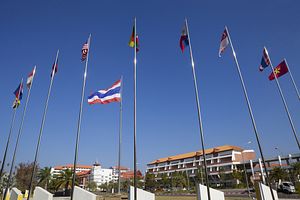The launch of the ASEAN Economic Community (AEC) could deliver substantial prosperity to poorer members of the trading bloc while promoting deeper regional integration, but the benefits could be uneven amid rising inequality unless governments act decisively, a key report has warned.
A joint report by the International Labor Organization (ILO) and the Asian Development Bank (ADB) forecast that AEC could generate more than 60 million high, medium and low skilled jobs once it’s launched by the end of next year.
“Ultimately ASEAN’s plan for greater regional integration will be judged on how much it benefits ordinary working men and women in the region,” said Yoshiteru Uramoto, ILO Assistant Director-General. “Policy makers must not miss this opportunity to ensure the benefits of the region’s impressive development are enjoyed by all.”
The report anticipates gains among the 10-countries in the Association of South East Asian Nations (ASEAN) will not be distributed evenly, could increase inequality, and worsen existing labour problems, particularly among the vulnerable in the informal employment sector and the poor.
To counter this, it urges member states to develop policies and institutions that support inclusive and fair development.
“In particular, there is an urgent need to improve the quality, coverage and sustainability of social protection, starting with the establishment of a social protection floor for all.”
The report was a mixed blessing for ASEAN and its constantly delayed attempts to establish an AEC – styled on the European Union but without a common currency or total freedom of movement for all of its citizens.
The emphasis is firmly on business, harmonizing laws and removing cross-border paperwork on trade and the movement of labor. Once implemented the AEC will form the basis of a single market and production base of 600 million people with a total GDP of US$2.3 trillion.
China and India, with populations in excess of 1.2 billion each, have GDP’s in excess of US$8.3 trillion and US$1.8 trillion respectively.
Wealthier members with a skilled workforce like Singapore, Thailand, Malaysia, the Philippines and Indonesia are expected to do well. The ILO/ADB report predicts that high-skilled employment will grow by 41 percent, adding 14 million jobs.
That compares with 22 percent growth, or 38 million jobs for the medium skilled and 24 percent growth, or 12 million jobs, among the low skilled, which will impact directly on the poorer members of ASEAN – Cambodia, Laos and Myanmar.
Labour migration is unlikely to help in ironing out supply and demand differentials at the higher end. The report found that the type of migration within ASEAN would be centered on low and medium-skilled workers and this would increase in response to demand, particularly in the construction, agricultural and domestic work sectors.
The free flow of skilled workers was expected to affect less than one percent of total employment and would not satisfy demand, a major issue if the AEC is to compete against the likes of China, India and Japan.
The report also predicts “that skills shortages and skills mismatches are likely to worsen, due to inadequate availability and quality of education and training.”
It said to attract and retain their skilled workers businesses would need to more compete on the basis of productivity and develop institutions to better link wages to productivity.
“Investment in labour productivity is critically important for the sustained development of ASEAN,” Arjun Goswami, Director of the ADB’s office of Regional Economic Integration, said.
One major concern is the food processing industry. The ILO/ADB report said regional trade integration and inadequate linkages within the industry could weaken food processing in Cambodia, Indonesia and Laos, resulting in job losses.
“Concerted policy efforts will be required to strengthen the value chains associated with agriculture,” the report found.

































